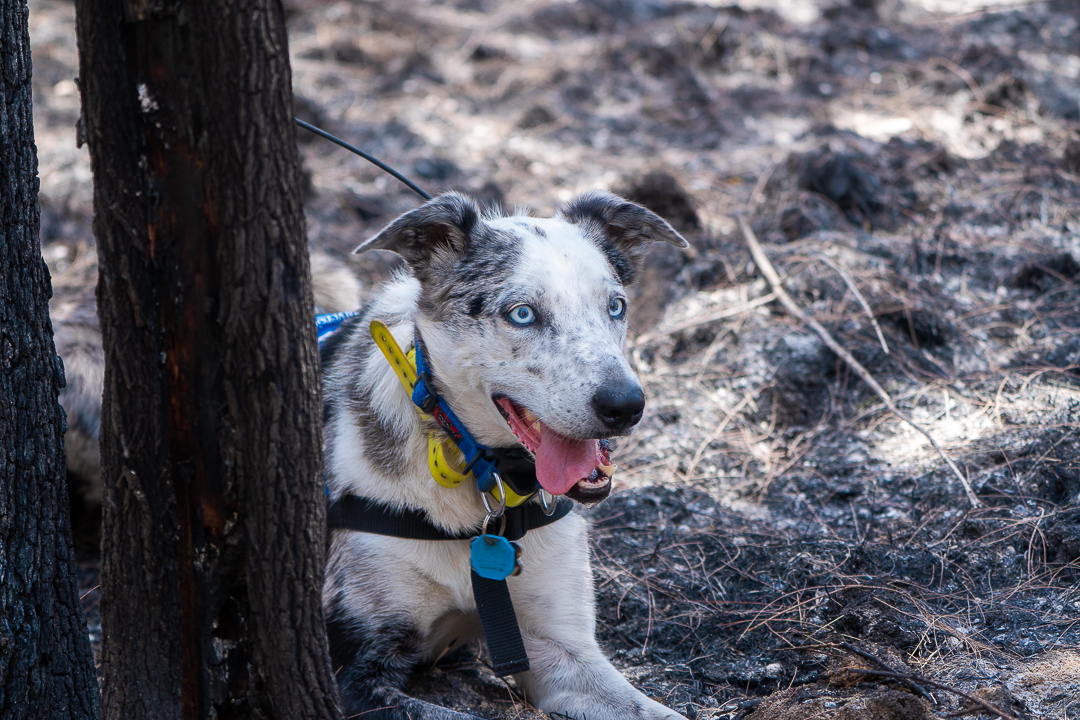Josey Sharrad
Bear on track to find koalas
Bear on track to find koalas

Ellie Milano, Companion Animal Programme Officer, contributed to this report. –The eds.
We’re standing on a grassy slope in a large open field, clouds darkening the sky overhead as Cyclone Debbie closes in over the Sunshine Coast in Queensland, Australia.
Despite the impending weather, the team has brought Bear, IFAW’s Koala Detection Dog in training at the University of the Sunshine Coast’s Detection Dog for Conservation programme, out to the testing site to give a demonstration of all that he’s learned over the past two years on his way to a career in species conservation.
Bear has an unfortunately all-too-common backstory. Purchased as a puppy, his family was disheartened to discover that his high energy and extreme toy-drive was too much for them to handle. Luckily for Bear, that’s when the University team found him. In partnership with IFAW, the training team is able to give him a second chance…so he can give a second chance to koalas!
He and his canine colleagues all have one mission – to sniff out koalas. Following in the footsteps of Maya, the koala poo detection dog, also rescued from death row, Bear is being trained to sniff out live koalas. But Bear has an extra challenge on his paws, he’s being trained purely on koala scent not the koala itself. At this stage of training the team uses koala fur to as a source of scent. Importantly, positive reinforcement methods are being used so that Bear associates a reward with locating the scent of a koala. Over time, Bear has learned that he’s only rewarded once he locates the freshest scent around by leading the team to the exact location of the ’koala‘ (i.e. a small bit of koala fur). Once he finds his target, he gets his ball – and runs off away from the ‘koala’ to play with it!
Bear has zero prey drive (no interest in wildlife) and 100% play drive, making him the ideal conservation dog. He has passed this stage of training with flying colours and his skills are now being fine-tuned and scientifically tested.
The team has already proven that dogs are more effective than human spotters in finding evidence of koalas and their scat (poo). So by training dogs to do the job instead of humans, we’re not only giving second chances to potentially un-home-able dogs, we’re also increasing our ability to locate and rescue koalas.
For the test, we distracted Bear with his ball (which was pretty easy to do as it’s his favourite thing in the world) while Romane from the University laid a scent trail with koala fur in the long grass about a hundred metres long across the field leaving the fur by a stone. None of us humans could possibly see where the fur was there was so little of it. And this is why the use of dogs to track live koalas is so important. They can smell what we can’t see. the entire reserve had been searched by Bear
Then Russell, Bear’s handler, lets Bear do his thing. Eyes on Russell, Bear suddenly goes statue-still, poised for flight and completely focused. Bear does a quick spin - unable to contain his enthusiasm for the job he’s about to do. Russell holds Bear’s focus for a few more seconds, and then, with a slight motion of the hand, he signals and Bear is off! Nose to the ground, he instantly locates the trail, and moves quickly into the field with Russell close on his heels. About 50 metres out Bear makes a perfect 90 degree turn – following the trail exactly as it’s been laid down. He leads Russell excitedly across the field and directly toward where the fur is hidden. Russell rewards Bear with his ball, and he races off in victory.
Bear lives with Russell and they work together every day, constantly learning and growing as a team. We are all delighted with Bear’s progress, not many dogs have what it takes to be a detection dog but then, Bear is a very special dog. We hope that he will be out in the field very soon!
--Josey Sharrad
Related content
Our work can’t get done without you. Please give what you can to help animals thrive.